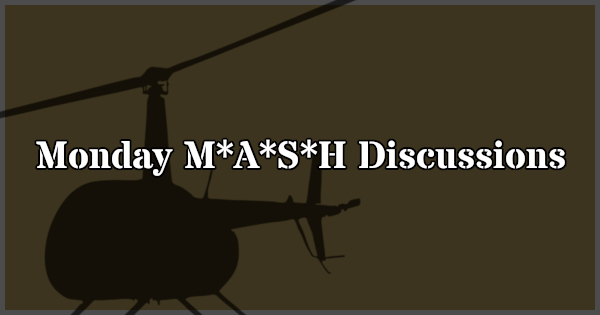Monday M*A*S*H Discussions offers fans the opportunity to offer their opinions on a wide variety of topics relating to M*A*S*H. Please share your thoughts and ideas in the comments section. My hope is these discussion posts will continue to elicit comments in the weeks and months after they’re initially published. Have a suggestion about something you think might be worth discussing? Let me know and maybe it will become my next Monday M*A*S*H Discussion topic.
Today’s topic: Was the “letter home” used too often?
Dear Whomever
From the very beginning, M*A*S*H utilized the “letter home” format to give viewers a glimpse of life at the 4077th. In “M*A*S*H–The Pilot,” Hawkeye writes a letter to his father. The three “Dear Dad” episodes during the first two seasons focus exclusively on letters written by Hawkeye. During Season 3, Hawkeye dictates a letter (“A Full Rich Day”).
Several other episodes revolved around letters written to family members:
-During Season 4, Colonel Potter writes to his wife (“Dear Mildred”), B.J. writes to his wife (“Dear Peggy”), and Radar writes to his mother (“Dear Ma”).
-It’s not a handwritten letter, but in Season 7 Charles dictates a letter to his parents using his tape recorder (“The Winchester Tapes”).
-In Season 7, Father Mulcahy writes to his sister the sister (“Dear Sis”).
-In Season 8, Klinger writes to his Uncle Abdul (“Dear Uncle Abdul”).
The Season 3 episode “Bulletin Board” includes a brief scene in which Trapper writes to his daughter Becky. Otherwise, Trapper never writes home. Nor do Frank, Margaret, or Henry. In “Letters” during Season 9, Margaret does write a letter to Jimmy, telling him about a patient she’ll never forget.
I’m probably leaving out a few minor letters but I believe I’ve mentioned all of the significant “letter home” episodes.
(Although not letters home, Sidney writes to Sigmund Freud in “Dear Sigmund” during Season 5 and Kwang writes a letter to his superiors while spying on the 4077th in “Dear Comrade” during Season 7.)
Let’s Discuss
Based on the above, you might think there are a lot of “letter home” episodes. But by my count, there are just 11. If you count Trapper’s letter in “Bulletin Board,” that’s 12. Add in “Dear Sigmund” and “Dear Comrade” and there are 14 episodes involving letters/tapes. Twelve or fourteen episodes out of 251 isn’t very many. But having three “letter home” episodes during Season 4 was a bit excessive.
Do you enjoy these episodes? Do they annoy you? Do you have trouble suspending your disbelief when the person writing the letter wasn’t involved in some of the stories they’re writing about?
Hit the comments with your thoughts.





For me, personally, the letter home (and their particular variations) are some of my favorite episodes. In my opinion, they make the episode flow very well without the need to include an inordinate amount of plot building. As a result, these episodes seem to have much more action/story/plot than most because they can use the time )that would have been earmarked for plot introduction) to include more plot development. Also, in many cases, the frequent and frenetic changes of perspective in these episodes only add to the hilarity of the show.
I totally agree. They were some of my favorites as well. Thinking back, your point about how they didn’t really need as much time on setting up the plot is a very good one. The “writer” could just explain in a few words what was going on instead of a whole scene being devoted to it. It allowed the plot to get right to the meat of the action. Also, I think it gave the audience a chance to hear from different perspectives.
I agree with penguinphysics above. Having the letter format show allowed them to have more “random” type episodes, with random scenes that are only connected because the letter writer is writing about them, as opposed to a single flowing episode with a strict plot line. This is especially seen in the early Dear Dad episodes. I enjoy them for this, and like that each character, almost, gets their own letter type episode.
The only gripe I guess I would have is that they are yet ANOTHER example of the “Hawkeye & Friends” show, since he’s the only one who gets more than one “letter” episode.
That is, precisely, my feeling about these episodes. In my opinion, the pinnacle was Dear Sigmund because it was a nearly perfect blend of laugh-out-loud comedy and drama, while giving each character their own memorable scene (either funny or not) In spite of it being written and directed by Alda, it is evidence that he doesn’t need to be the center of his own little universe and still crank out a fantastic show.
I really have no complaints at all about the letter home episodes (except that maybe it was a little unnecessary that Hawkeye had multiple such episodes in comparison to other characters). If anything, not only do such episodes provide some insight into how these particular characters see, observe, and deal with the craziness happening around them in their own way, which gives us a bit of character development . . . and we really needed that in Season 4, since we had two new kids on the the block: B.J. and Potter (the latter of whom even describes in his letter to Mildred having to deal with just that). And you know what’s particularly amusing about the Season 4 letter home episodes? They have one thing in common: trash-talking Frank.
B.J.: “Which brings me to Major Frank Burns. Not one of our better doctors. Hawkeye says he became a surgeon after he washed out at embalmer’s school.”
POTTER: “Ran into Majors Houlihan and Burns. She’s the Head Nurse. He’s the head twerp.”
RADAR: “All of our doctors are really terrif. Except for Major Burns, of course.”
Even Trapper in his brief letter to his daughter describes Frank as, “Sort of a substitute teacher who stays all year.”
But nevertheless, I do feel that the letter home episodes served their purpose, and as I said, it gave us some insight into the characters. Charles’s tape to his parents was particularly amusing in how he embellished a lot of his anecdotes, such as how he claimed he was endearing himself to Potter, or describing Klinger as a transvestite with dreadful taste in clothes, and Margaret as, “Part seductress and part Atilla the Hun.”
I always loved the letter home episodes. I’m a fan of “unusual” plot devices and the letter home format made for a nice change of pace from the episodes surrounding it.
I don’t think it was overused, but on the other hand I don’t think it should have been used more. I feel that if it were to be used excessively it would lose some of its charm. I do wish there were more characters that had a letter episode focus on them. The most obvious example would have been Margaret, particularly as she grew later in the series.
This is a subject I’ve thought about quite a bit. I do feel like, in some ways, having so many of them kind of diminished the novelty of the format itself. However, I do agree with what everyone else said. Even after the novelty wore off a bit, it doesn’t change the fact that it still allowed the writers to explore these characters and setting in a different way than usual, and often resulted in some pretty refreshing comedy and drama. And pretty much all of them were great in their own ways. The only one I ever disliked was “Dear Uncle Abdul,” and while that’s still easily my least favorite of the bunch, I’ve kind of warmed up to it a bit more upon repeated viewings.
If they had continued on with the Dear Dad ones, especially with how close together the three we had were, than I agree it could have very quickly been too much and lost the novelty, so it’s good they decided to change it up and have letters/tapes from others.
Definitely agree on “Dear Uncle Abdul” as well. That episode is garbage. It wasn’t even really a “Klinger writes a letter” episode. It was just a BJ and Hawkeye episode, with BJ being a turd bucket…as usual and Hawkeye being in the spotlight…as usual.
You gotta love Charles’ reaction when Margaret shoots her footlocker though. David Ogden Stiers was brilliant 🙂
I’ve been thinking about topics to discuss and I’d like to suggest comparisons of character transitions and how significant they were to the show (which one was the most significant). Trapper -> BJ, Henry -> Potter, Frank -> Winchester, etc…
That’s a good topic. I always thought it was a real credit to the writing that they had to replace 3 of the main 5 characters on a hit show within 2 years and still kept it rolling. Many shows fall apart or completely lose their momentum, but I think the changes added to the longevity of the show.
One of the more interesting things about the letters home episodes in general, in my opinion, is that when one looks at TV in the early/mid 1970s, most sitcoms had 1 or maybe 2 stories per episodes. They were not fast-paced. Those M*A*S*H episodes in particular were full of stories and fast-paced… and I think one of the reasons why the show has lasted for so long and is still popular is that it does not feel slow compared to TV today. Yes, it isn’t 20 scenes in 20 minutes the way Seinfeld was, but there were episodes with 4 storylines, which was unusual at the time. Another factor helping the longevity of M*A*S*H is being set in the 50s… the show never looks dated because it is set in a period.
It’s funny that you made that comparison, because SEINFELD is always credited for setting the standard for multiple storylines per episodes (mainly because each episode had to have an individual subplot for each of the four main characters), but it was really M*A*S*H that pioneered that.